-
2024年12月1日起,在华出口经营者可能需要申报适用的出口管制编码。
As from December 1, 2024, the export business operator may need to declare the ECSC for export control clearance when applicable.
-
鉴于商务部可能加强对企业合规内控机制的评估,企业需要考虑建立符合《两用物项出口管制内部合规指南》的合规内控机制。
Considering that the Mistry of Commerce is likely to enhance its assessment of EBOs’ ICP, EBOs must consider setting up a proper ICP in line with the Guidelines on the Establishment of Internal Compliance Programs for Export Controls of Dual-Use Items.
在《两用物项出口管制条例(征求意见稿)》(以下简称“《征求意见稿”》)出台两年多后,2024年10月19日,我国正式公布了《中华人民共和国两用物项出口管制条例》(以下简称“《两用物项条例》”或“条例”),该条例于2024年12月1日起施行。
After two years since releasing the Draft Regulations on Export Control of Dual-Use Items for Public Comments (“Draft Regulations”), the State Council of China officially issued the Regulations on Export Control of Dual-Use Items (“Dual-Use Regulations”) on October 19, 2024, which will come into force on December 1, 2024.
就《两用物项条例》新的细化性以及新的规定,我们评述如下:
What follows are our commentaries on the Dual-Use Regulations.
一、管制物项问题
Scope of Controlled Items
根据《两用物项条例》第四十七条,除了典型的两用物项之外,该条例澄清了如下两点:(1)就监控化学品出口管制,应适用《中华人民共和国监控化学品管理条例》,《出口管制法》以及该条例仅起到补充适用的作用;(2)《导弹及相关物项和技术出口管制清单》第一部分所列物项和技术视为军品予以管理,不再受到《两用物项条例》的管制。
As per Article 47 of the Dual-Use Regulations, apart from those traditional dual-use items, it is clarified that (1) the Regulations on Administration of Controlled Chemicals shall be applied first to the export control of controlled chemicals as to which the Export Control Law (“ECL”) and the Dual-Use Regulations only function as supplement provisions, and (2) the items and technologies listed in Part I of the Missile and Missile-Related Items and Technologies Export Control List are deemed as military items and are no longer subject to the Dual-Use Regulations.
该条例第四十七条仍重申了《出口管制法》第二条的内容,即“其他与维护国家安全和利益、履行防扩散等国际义务相关的货物、技术、服务等物项的出口管制”,适用该条例。何为“其他与维护国家安全和利益”相关的物项,该条例语焉未详。《征求意见稿》曾将这类“其他物项”局限在“列入两用物项出口管制清单”的物项。而《两用物项条例》则没有这一限制性规定。这有赖于立法者就两用物项清单之外的出口管制性措施进行解释,例如需要澄清限制或禁止出口的技术目录中所管制出口的技术的原因,是否基于国家安全的考虑。如果属于国家安全范畴,则违反者将很可能同时受到本条例以及所对应的技术进出口有关条例的双重处罚(参见条例第四十六条)。
Article 47 of the Dual-Use Regulations reiterates Article 2 of ECL to the effect that the Dual-Use Regulations shall apply to the export control of “other goods, technologies, services, and items that are related to the protection of national security and interests or the fulfillment of nonproliferation or other international obligations”. No official sound can be heard as to what constitute other export controls “related to the protection of national security and interests”. The Draft Regulations had confined such “other items” to those items “further included in the export control list of dual-use items”. However, the Dual-Use Regulations does not adopt such a confinement. It may in practice depend on the legislator’s interpretation of such other items beyond the dual-use list. For instance, it needs to be clarified whether export control of technologies in the Catalogue of Technologies Subject to Export Restrictions or Prohibitions is based on national security considerations. If they do fall within the scope of national security, anyone in violation, mainly the exporting business operator (“EBO”), will likely be penalized by the Dual-Use Regulations, as well as the corresponding regulations relating to the import and export of technologies as per Article 46 of the Dual-Use Regulations.

二、取消出口经营者登记
Abolishment of EBO Registration
目前尚且有效的《中华人民共和国敏感物项和技术出口经营登记管理办法》规定,凡从事敏感物项和技术(主要包括核两用品及相关技术、导弹及相关物项和技术、生物两用品及相关设备和技术以及有关化学品及相关设备和技术)出口的经营者,必须按照本办法规定向商务部申请登记,方可从事相关出口业务。
According to the currently effective Measures of the PRC for the Administration of Registration of Export Operations of Sensitive Items and Technologies, EBOs engaged in the export of sensitive items and technologies (mainly including nuclear dual-use items and related technologies, missiles and related items and technologies, biological dual-use items and related equipment and technologies, and certain chemicals and related equipment and technologies) must, in accordance with the provisions of the Measures, apply for registration with the Ministry of Commerce (“MOFOCM”) to conduct related export business.
2022年12月30日,十三届全国人大常委会第三十八次会议经表决,通过了关于修改对外贸易法的决定,删去《中华人民共和国对外贸易法》原第九条关于对外贸易经营者备案登记的规定。《征求意见稿》和《两用物项条例》也均对应取消了出口经营者登记的要求。
On December 30, 2022, the Standing Committee of the 13th National People’s Congress voted at its 38th Meeting to adopt the decision on amending the Foreign Trade Law, deleting the previous Article 9 regarding the filing and registration requirement for foreign trade operators. Both the Draft Regulations and the Dual-Use Regulations correspondingly abolish the requirement of the EBO registration.
三、出口管制物项编码问题
Export Control Supervision Code
《征求意见稿》第十三条曾规定两用物项清单内将设置两用物项出口管制编码,不过《两用物项条例》删去了这一规定。
Article 13 of the Draft Regulations provided that an Export Control Supervision Code (“ECSC”) would be set up in the list of dual-use items. However, this provision is deleted in the Dual-Use Regulations.
根据商务部官员的口头解释,中国政府将在两用物项清单内设置类似美国ECCN编码的出口管制编码。2024年11月15日,中国政府重新公布了两用物项清单,增添了出口管制编码,自2024年12月1日起执行。商务部表示,除了所增加的出口管制编码外,管制内容并没有改变。2024年12月1日起,在华出口经营者可能需要申报适用的出口管制编码。
Nonetheless, according to verbal explanations by MOFCOM officials, the Chinese government will apply the ECSC for controlled dual-use items, with a pattern similar to the U.S. Export Control Classification Number (“ECCN”). On November 15, 2024, the Chinese government re-issued the dual-use export control list, affording the ECSC to the controlled items, though the items controlled remain unchanged, according to MOFCOM. As from December 1, 2024, the export business operator may need to declare the ECSC for export control clearance when applicable.
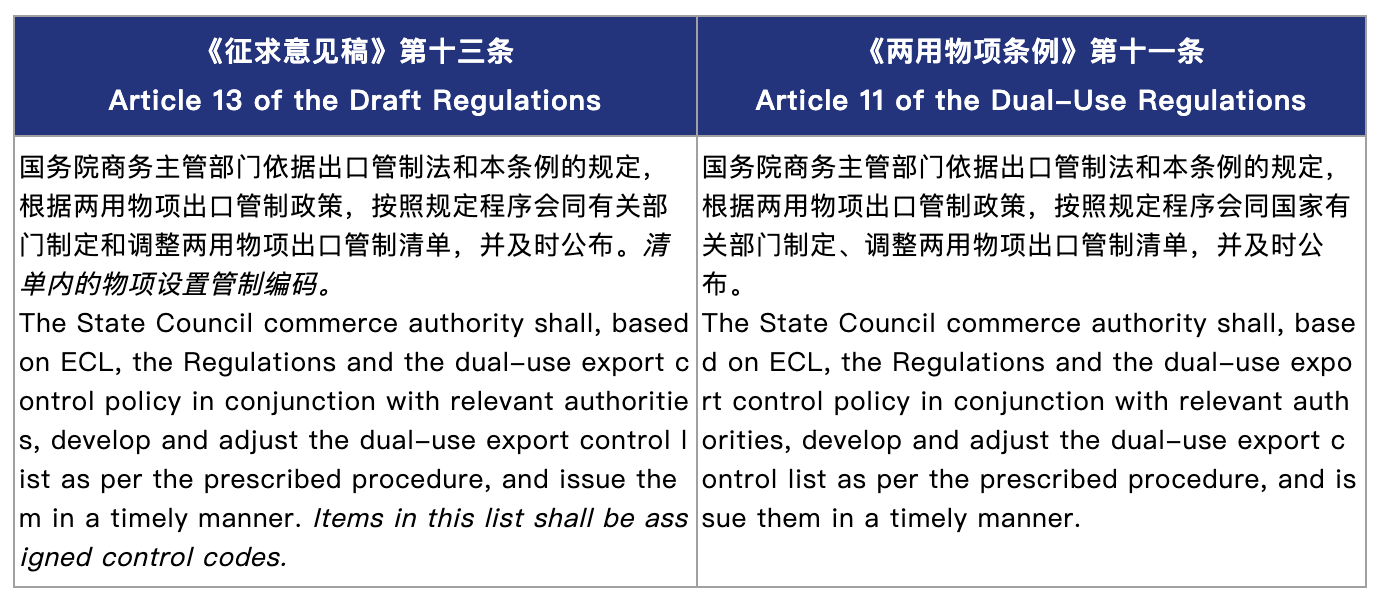
四、临时管制
Temporary Control
除了常见的清单管制外,《两用物项条例》沿袭了《出口管制法》的规定,允许对两用物项出口管制清单以外的货物、技术和服务实施临时管制,并予以公告。
In addition to the common list controls, the Dual-Use Regulations follows the provisions of ECL to maintain temporary controls on certain goods, technologies, and services that are not on the control list of dual-use items and make corresponding announcements.
以2024年为例,我国商务部先后对航空航天结构件及发动机制造相关装备及软件或技术、燃气涡轮发动机/燃气轮机制造相关装备及软件或者技术、航天服面窗相关装备及软件或技术、超高分子量聚乙烯纤维相关物项、锑相关物项、超硬材料相关物项等实施了此种临时管制。
In 2024, for instance, MOFCOM has implemented temporary controls on equipment and software, or technology related to aerospace structural parts and engine manufacturing, equipment, and software or technology related to gas turbine engine/gas turbine manufacturing, equipment and software or technology related to spacesuit visors, items related to ultra-high molecular weight polyethylene fibers, items related to antimony, and items related to superhard materials.
与《征求意见稿》相比,《两用物项条例》的一大变化在于增加了“延长临时管制不得超过2次”的程序性规定。
A major change in the Dual-Use Regulations compared with the Draft Regulations is the addition of a procedural requirement that “temporary control shall not be extended more than two times”.
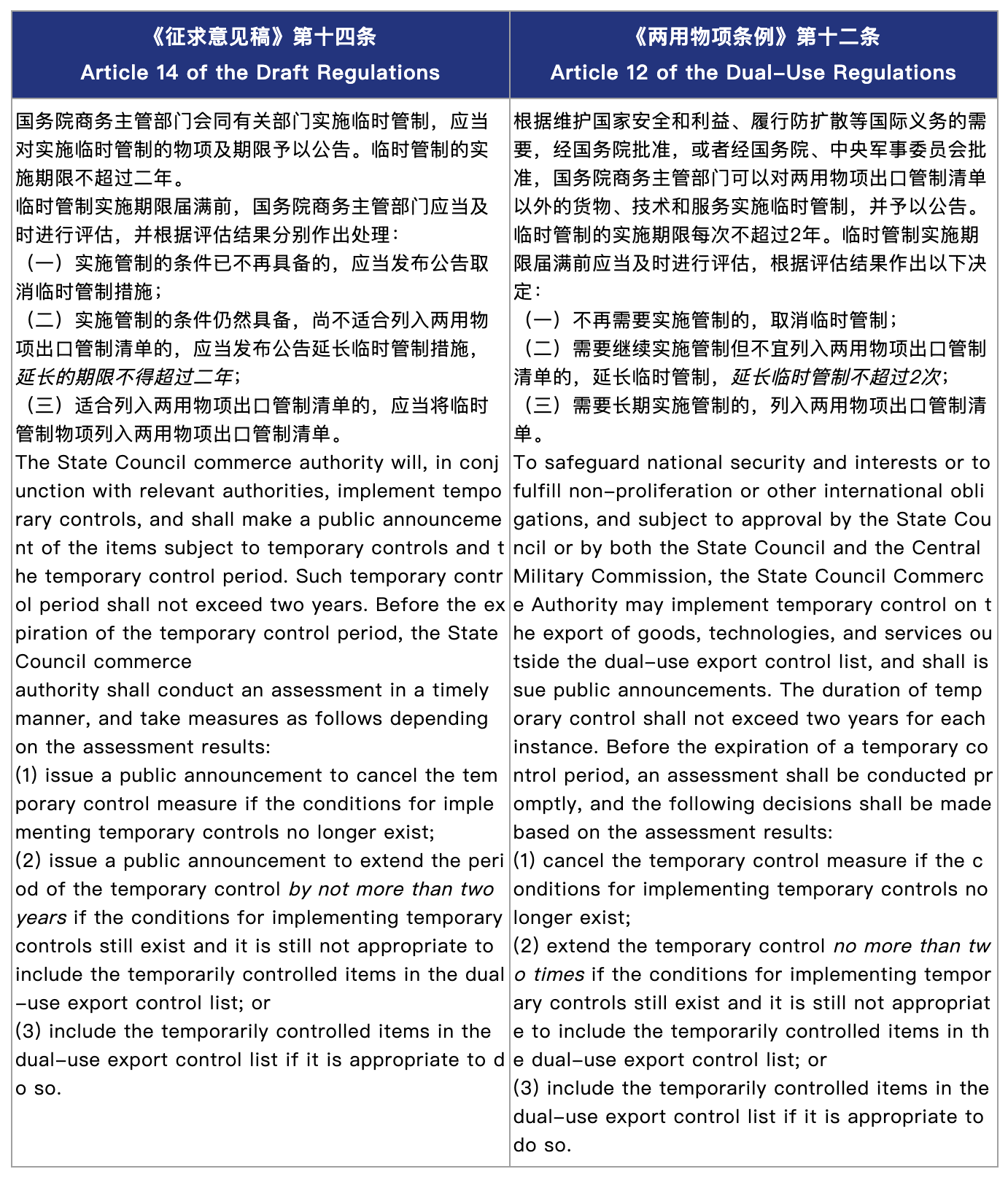
五、通用许可问题
Multiple-use License
通用许可是给予特定企业的便利待遇,特定出口经营者在出口许可证件载明的范围、条件和有效期内,向单一或者多个最终用户多次出口特定两用物项。
As a facility granted to a specific enterprise, the multiple-use license (the general license as so-called in Chinese) scheme allows specific EBOs to export specific dual-use items to a single or multiple end-users, within the scope, conditions, and validity period set out in the export license document for multiple times.
对于通用许可的条件,《征求意见稿》第二十三条规定了“(二)从事两用物项出口业务两年以上(含两年),并多次取得两用物项出口许可”这一附加条件。笔者在之前对《征求意见稿篇》的述评中,其中“两年”的要求除了阻碍企业获得通用许可外,意义不大。《两用物项条例》则不再要求申请通用许可的经营者必须从事两用物项出口业务两年以上(含两年)。
For the conditions for a multiple-use license, Article 23 of the Draft Regulations once stipulated that “(2) has been engaged in the export business of dual-use items for more than two years (including two years) and has obtained export licenses for dual-use items for many times”. As the author commented, the requirement of “two years” is useless except that it prevents EBOs from obtaining such a multiple-use license. The Dual-Use Regulations no longer requires that EBOs applying for a multiple-use license must have been engaged in the business of exporting dual-use items for more than two years (including two years).
需要注意的是,《两用物项条例》仍要求出口经营者建立运行良好的内部合规制度,以及具有相关两用物项出口记录和相对固定的出口渠道及最终用户,作为获得通用许可的条件。
Please note that the Dual-Use Regulations still requires EBOs set up a well-functioning internal compliance program (“ICP”), as well as a record of exporting relevant dual-use items and relatively fixed export channels and end-users, as a condition for obtaining a multiple-use license.
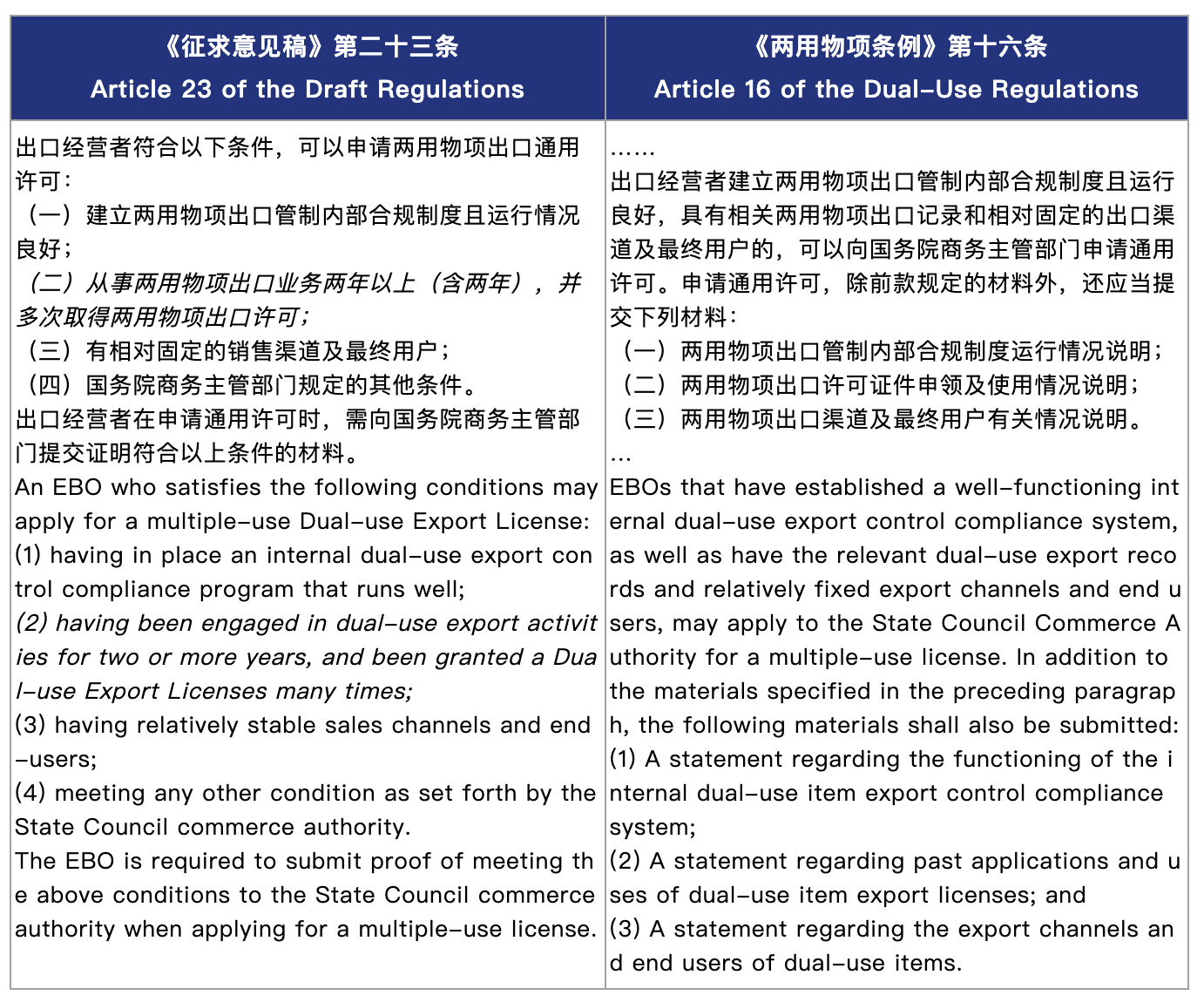
六、出口凭证项下的登记制度
Export Certificates through Registration
在单项许可和通用许可制度之外,《征求意见稿》第二十五条曾试图引入“免予许可”制度,并将其限于进境维修、展览等暂时进口后复出口,以及民用飞机零部件出境维修即暂时出口的情况。
Apart from the individual licenses and multiple-use licenses, Article 25 of the Draft Regulations attempted to introduce a “license exemption” regime and restrict its application to export after temporary import for inspection, exhibitions, as well as the export of civil aircraft parts and components for maintenance.
《两用物项条例》用“以登记填报信息方式获得出口凭证”取代了“免予许可”的提法。根据《两用物项条例》第十五条规定,如果特定两用物项出口符合规定的条件,出口经营者应当在该物项每次出口前向国务院商务主管部门办理登记,按照规定如实填报相关信息获得出口凭证后,再凭出口凭证自行出口。
The Dual-Use Regulations replaces the name “license exemption” with “obtaining an export certificate through information registration”. According to Article 15 of the Dual-Use Regulations, if the export of specific dual-use items meets the prescribed conditions, the EBO shall register with the competent department of commerce under the State Council prior to each export and obtain an export certificate by filling in the relevant information truthfully in accordance with the provisions, and then conduct exports with the export certificate.
此外,与《征求意见稿》相比,《两用物项条例》增加了适用出口凭证登记的出口交易类型。与美国《出口管理条例》(以下简称“EAR”)项下的许可例外(License Exception)制度相比,我国适用出口凭证的范围仍十分有限。为鼓励外资继续在华设立、维持研发中心和机构,笔者建议未来或可考虑就下述活动所涉及的出口考虑给予“出口凭证”待遇:(1)相关技术原本从境外关联公司进口或者进境,又复出口给原技术权利人的;(2)在境内利用境外关联公司的技术单独或共同研发出的改进性技术,根据委托或者共同开发协议,相关技术成果应向境外出口给委托方或者共同开发方的。
In addition, compared with the Exposure Draft, although the Dual-Use Regulations have increased the types of export transactions that are subject to Export Certificates through Registration compared with the Draft Regulations, its application is still very narrow and limited compared with the License Exception system under the U.S. Export Administration Regulations (“EAR”). To encourage foreign investors to continue to set up and maintain Research & Development centers and institutions in China, the author suggests that in the future, the Chinese government may consider granting the treatment of “export certificates through registration” to the following activities: (1) the relevant technology was originally imported from the overseas affiliates, and then re-exported to the original technology right holders; and (2) the improved technologies developed individually or jointly by utilizing the technologies of the overseas affiliates in the domestic market, and according to the entrustment or joint development agreement, the relevant technological achievements shall be exported to the entrusted party or the joint development party abroad.
鉴于国务院商务主管部门仍有权规定适用出口凭证的其他情形,可以预见,适用出口凭证的出口交易或者出口转移的类别将会逐步增加。
Considering that the competent authorities still have the right to prescribe other circumstances in which the export certificates through registration are applicable, it is foreseeable that the categories of export transactions or transfers under this facilitation will gradually increase.
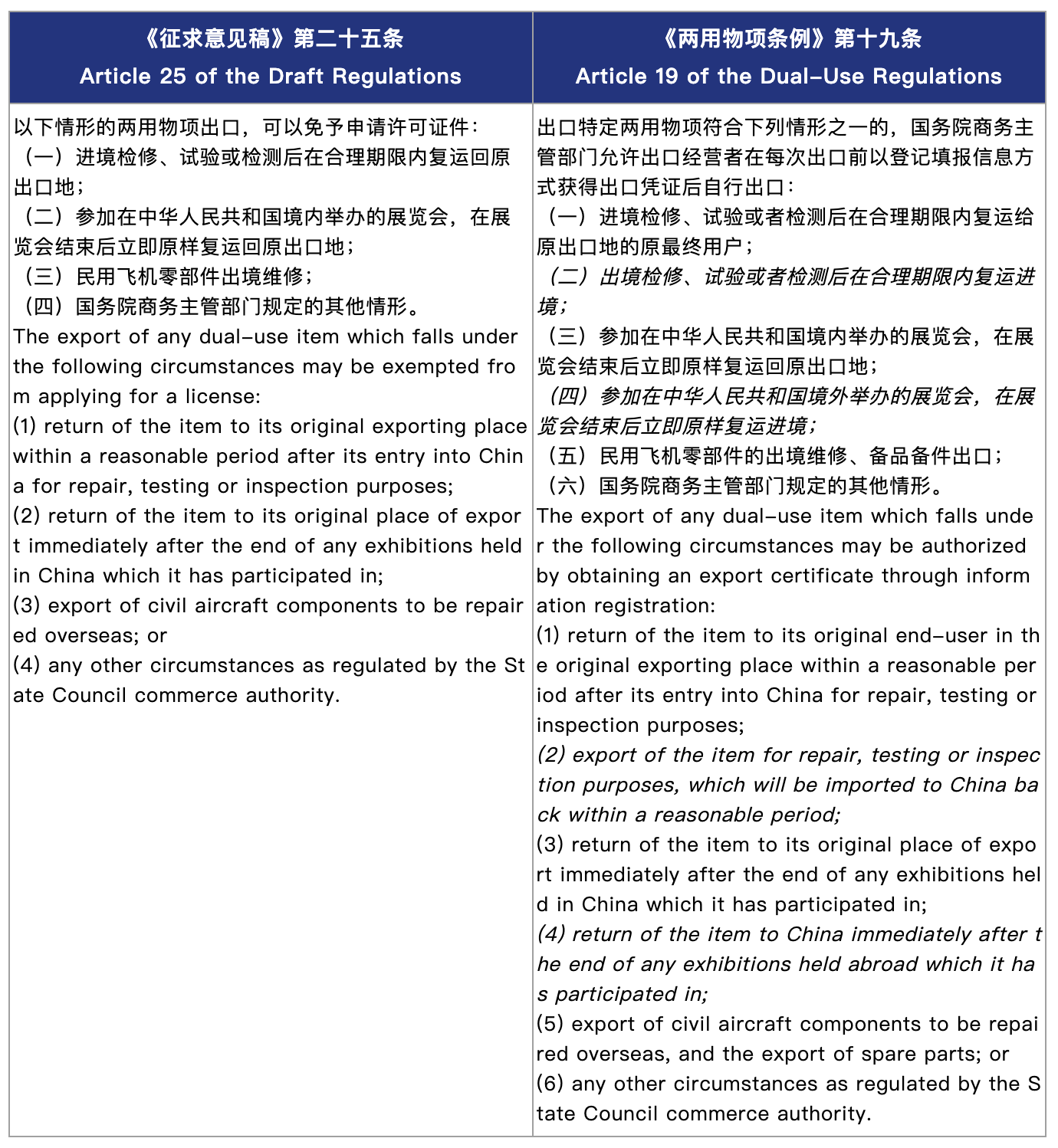
七、最终用户和最终用途管理
End-user & End-use Management
两用物项出口管制的重点之一是最终用户和最终用途的管理。《两用物项条例》对此规定如下:
A key aspect of dual-use items export control is the end-user and end-use management. The Dual-Use Regulations provide for this as follows.
首先,根据《两用物项条例》第十六条和第二十四条,申请两用物项出口许可时应当提交最终用户出具的最终用户和最终用途证明文件,并不得擅自改变最终用户和最终用途。
Firstly, according to Articles 16 & 24 of the Dual-Use Regulations, an end-user and end-use certificate is required for dual-use items license application and the end-user and end-use shall not be changed without authorization.
其次,根据《两用物项条例》第二十五条,若最终用户或最终用途已经改变或者可能改变,或者最终用户和最终用途证明文件存在伪造、变造、失效等情形或系通过欺骗、贿赂等不正当手段获取,出口经营者和(境外)进口商应立即停止有关交易并向主管部门报告。
Secondly, according to Article 25 of the Dual-Use Regulations, if the end-user or end-use has been changed or is likely to be changed, or if the end-user and end-use certificates have been forged, altered, or invalidated, or have been obtained by improper means such as deception or bribery, the EBOs and foreign importers shall immediately stop the relevant transactions and report to the competent authorities.
再次,《两用物项条例》第二十六条和第二十八条针对存在违法行为的最终用户建立了关注名单(新制度)和管控名单两项黑名单制度,两份名单的具体介绍请参见下文。
In addition, Articles 26 & 28 of the Dual-Use Regulations establish two blacklisting systems, the Concern List (a new list) and the Controlled List for end-users who have violated the corresponding provisions, as described below.
八、管控名单和关注名单
Controlled List and Concern List
《出口管制法》第十八条和《征求意见稿》第三十一条均已提到建立管控名单,列入存在以下情况的进口商、最终用户:(一)违反最终用户或者最终用途管理要求;(二)可能危害国家安全和利益;(三)将两用物项用于恐怖主义目的。在此基础上,本次《两用物项条例》在第三章专列一节,规定了列入或移除这一名单的条件。
Both Article 18 of ECL and Article 31 of the Draft Regulations have mentioned the establishment of the Controlled List of importers and end-users who are identified as falling into any of the following circumstances: (1) breach of the regulatory requirements regarding end-users or end-uses; (2) posing of a potential endangerment to national security and interests; or (3) use of any controlled item for any terrorist purpose. On this basis, the Dual-Use Regulations include a special section in chapter III setting out the conditions for inclusion in or removal from the Controlled List.
在管控名单之外,《两用物项条例》创设了“关注名单”,用于收录未在规定期限内配合核查、提供有关证明材料,导致无法核实两用物项最终用户、最终用途的进口商、最终用户。出口经营者与被列入关注名单的实体从事交易可能面临以下不便之处:(一)不得申请通用许可或者以登记填报信息方式获得出口凭证;(二)申请单项许可时,应当提交对列入关注名单的进口商、最终用户的风险评估报告,并作出遵守出口管制法律法规和相关要求的承诺;以及(三)出口许可申请审查可突破45个工作日的限制。
In addition to the Controlled List, the Dual-Use Regulations creates a new “Concern List” for importers and end-users who fail to cooperate with the verification and provide relevant supporting documents within the specified period, resulting in the inability to verify the end-user and end-use of dual-use items. EBOs may face the following inconveniences when engaging in transactions with parties in the Concern List: (1) they may not apply for a multiple-use license or obtain an export certificate through registration; (2) they are obliged to submit a risk assessment report on the importers and end-users in the Concern List when applying for the individual licenses, as well as make a commitment to comply with the laws and regulations on export control and related requirements; and (3) the limit of 45 business days for the license review period may be exceeded when involving the Concern List parties.
就两份名单的关系而言,根据《两用物项条例》第二十八条的规定,关注名单上的进口商、最终用户若存在违反最终用户或者最终用途管理要求或可能危害国家安全和利益等情形,国务院商务主管部门可以将其列入管控名单,同时移出关注名单。
Regarding the relationship between the two lists, according to Article 28 of the Dual-Use Regulations, if importers or end-users on the Concern List are in violation of end-user or end-use management requirements or may jeopardize national security and interests and so forth, the competent authorities may add them to the Controlled List while simultaneously removing them from the Concern List.
九、海关出口管制监管与执法
Customs Supervision and Enforcement
《两用物项条例》项下海关对于出口管制的监管与执法权力包括:
The supervision and enforcement powers of the Customs related to export controls under the Dual-Use Regulations mainly include:
-
会同国务院商务主管部门、外交部对两用物项出口目的国家和地区进行评估,确定风险等级,采取相应的管制措施。(第十条) To coordinate with other competent authorities to evaluate the risk level of the exporting destinations or regions, and to take corresponding measures. (Article 10 of the Dual-Use Regulations)
-
对于未能提供两用物项出口许可证件的管制货物,海关不予放行。(第二十一条) Not to release the dual-use items if no export license is provided. (Article 21 of the Dual-Use Regulations)
-
对于有证据表明可能属于两用物项出口管制范围的,海关应当提出质疑,并不予放行。如商务部确认属于两用物项的,海关则可以依法处置。(第二十二条) To question the export if the Customs has evidence proving that the goods to be exported may fall within the scope of dual-use export control, and not to release the goods. If MOFCOM confirms the nature of controlled items, Customs may handle the suspect violations in accordance with law. (Article 22 of the Dual-Use Regulations)
-
法律、行政法规规定由海关处罚的,由其依照《出口管制法》和本《两用物项条例》进行处罚。(第四十五条)To impose penalties pursuant to ECL and the Dual-Use Regulations if within the jurisdiction of Customs. (Article 45 of the Dual-Use Regulations)
- 对两用物项在海关特殊监管区域和保税监管场所之间进出,或者由海关特殊监管区域和保税监管场所外进入海关特殊监管区域和保税监管场所进行监管。(第四十八条)To maintain supervision on the entry and exit of dual-use items between special customs control areas and bonded supervisory sites, and the entry from the outside into the special customs control areas and bonded supervisory sites. (Article 48 of the Dual-Use Regulations)
基于上述规定,海关对于两用物项的出口管制具有优先处罚权。同时海关具有配合商务部进行执法调查的义务。需要注意的是,其一,海关本身并不具有独立鉴定拟出口货物是否属于管制物项的权力,而仅能要求商务部组织开展鉴别;其二,出口经营者就拟出口物项是否属于两用物项进行判断属于严格责任;其三,当出口经营者无法确定拟出口物项是否属于两用物项时,除非依照程序事先就该问题向商务部提出咨询并得到不属于两用物项的确认,否则向海关无证出口申报该物项的行为可能构成违法行为。
It seems that Customs has the priority to penalize the violations of dual-use items export controls. At the same time, Customs is obliged to cooperate with MOFCOM in enforcement investigations. Please note that, firstly, Customs itself does not have the power to independently identify whether the goods to be exported are controlled items. Customs is to request MOFOCM to organize and conduct the identification in such a case. Secondly, EBOs themselves are strictly liable for determining whether the goods are subject to export controls. Last but not least, in the case that EBOs are unable to determine whether the goods to be exported are dual-use items or not, unless consulted with MOFCOM for dual-use item identification in advance and obtained a confirmation that it is not a controlled item, the export of controlled items without proper licenses constitutes a violation.
十、反规避规定
Anti-Circumvention Provisions
《两用物项条例》有两条反规避的规定:
There are two provisions related to anti-circumvention issues under the Dual-Use Regulations.
其一,第四十一条新增“教唆、帮助出口经营者、进口商、最终用户规避出口管制法和本条例的规定”的违法情形,对其处以警告,责令停止违法行为,没收违法所得以及罚款。
Firstly, under Article 41 of the Dual-use Regulations, “Those who abet or help EBOs, importers or end-users to circumvent the provisions of the ECL and these Regulations to commit illegal acts shall be given the following penalties…”
其二,第三十九条第一款第(四)新增“出口经营者以改造、拆分为部件或者组件等方式规避许可出口两用物项”的违法情形,对其按照《出口管制法》第三十四条的规定处罚。
Secondly, under the first paragraph of Article 39 of the Dual-use Regulations, “An EBO who commits any of the following acts shall be penalized in accordance with the provisions of article 34 of ECL… (4) circumventing the licensing of exporting dual-use items by modifying or splitting them into parts or components.”
何为“规避”?这是相当弹性的条款,涉及企业的合规界限,仍需要予以澄清。
It remains uncertain what constitutes such circumvention. Since it touches on the compliance boundaries of EBOs, this term needs to be further clarified.
十一、删去从轻或者减轻处罚规定
Deletion of the Provisions on “Lighter or Reduced Penalties”
《征求意见稿》第五十二条曾试图引入“从轻或者减轻处罚”的规定,也即出口经营者以及第三方服务商,如果对于违法行为及时采取补救措施、主动披露违反行为的,或者配合主管机关调查立功的,应当从轻或者减轻处罚;若建立出口管制内部合规制度且运行情况良好使违法行为危害后果没有进一步扩大的,可以酌情对其从轻处罚。《两用物项条例》删去了上述规定。
Article 52 of the Draft Regulations attempted to introduce the provision of “lighter or mitigated penalties”, i.e., the EBOs and third-party service providers shall be given a lighter or reduced penalty if they have taken proactive actions to eliminate or mitigate the harmful consequences of a violation as committed, have voluntarily confessed to a violation committed which has not yet been known, or have cooperated with an investigation with meritorious conduct. Besides, the EBOs and third-party service providers may be given a lighter penalty if they have in place an ICP that runs well, so that the harmful consequences of a violation committed are prevented from further spreading. Such provisions are deleted in the Dual-use Regulations.
尽管如此,《行政处罚法》第三十二条中关于“应当从轻或者减轻行政处罚”仍有可能适用于与出口管制违法有关的行政处罚,这类情形主要包括(一)主动消除或者减轻违法行为危害后果;(二)受他人胁迫或者诱骗实施违法行为;(三)主动供述行政机关尚未掌握的违法行为;以及(四)配合行政机关查处违法行为有立功表现。
Nonetheless, the provisions on “administrative penalties should be lightened or mitigated” under Article 32 of the Administrative Penalty Law may still be applied to administrative penalties related to export control violations, and such circumstances include (1) has taken the initiative to eliminate or lessen the harmful consequences brought about by the unlawful act; (2) was coerced or induced by others to commit the unlawful act; (3) has taken the initiative to confess an unlawful act that the administrative organ was not yet aware of; and (4) has performed meritorious deeds while working in coordination with the administrative organ to investigate unlawful acts.
此外,《两用物项条例》第四十条针对“出口经营者和第三方就违法行为未履行报告义务”规定了有关处罚,这似属于变相的主动披露的规定。
In addition, Article 40 of the Dual-use Regulations provides for penalties for “failure by the EBOs and third parties to report in respect of violations”, which is similar to the provision on self-disclosures.
十二、向境外提供信息和外国政府出口管制问题
Information Provision & Export Control by Foreign Governments
《征求意见稿》第四十五条第一款重申了《出口管制法》的内容,中国境内的组织和个人向境外提供两用物项出口管制相关信息,应当依法进行;可能危害国家安全和利益的,不得提供。《两用物项条例》第三十八条删去了这一规定。
The first paragraph of Article 45 of the Draft Regulations reiterates the content of ECL, i.e., any provision of information related to dual-use export control by an organization or individual within the territory of the PRC to those outside the territory of China shall be conducted in accordance with law; any such provision that may endanger national security and interests shall be prohibited. However, this part is deleted in Article 38 of the Dual-use Regulations.
就接受外国外国政府访问、现场核查这一问题,与《征求意见稿》相比,《两用物项条例》还新增了“接到外国政府提出的与出口管制相关的访问、现场核查等要求后应当立即报告”的义务。不过此规定主要针对的外国出口管制问题,并非中国出口管制管理问题。
Regarding the acceptance of visits or on-site inspections by foreign governments, the Dual-use Regulations, compared with the Draft Regulations, adds an obligation to “report immediately upon receipt of any export control-related visits or on-site inspections from a foreign government”. This provision is mainly related to foreign countries instead of China’s export control issues.
《两用物项条例》第三十八条将“向境外提供信息”的规定解释成“我国出口商接受外国政府访问、现场核查”这一情形,属于限制性解释。
Article 38 of the Dual-Use Regulations takes an approach of restrictive interpretations to limit “providing information outside the country” to the situation where “EBOs are faced with visits or on-site inspections by foreign governments”.
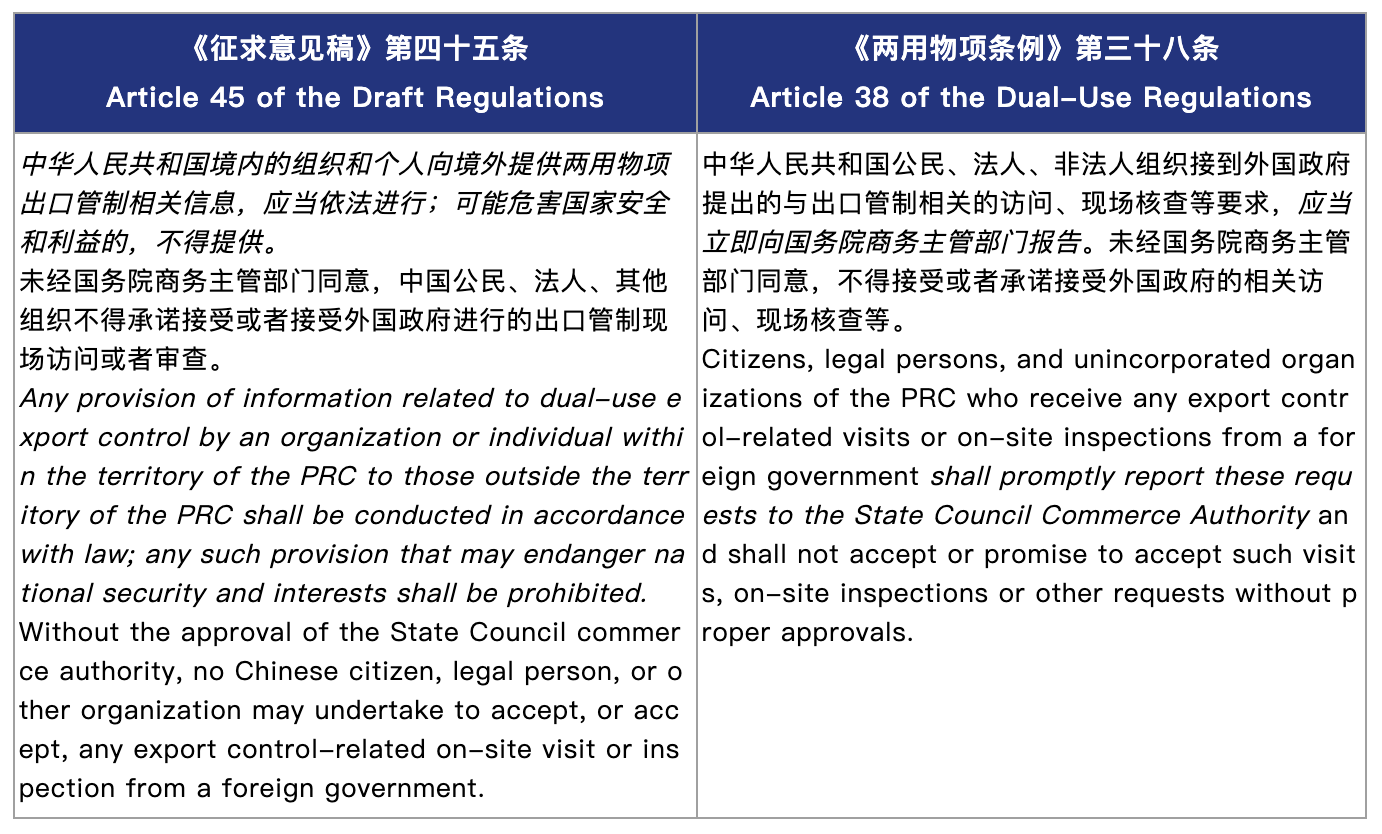
十三、境外再出口或者转移货物问题
Issue of re-exports & Transfers
《两用物项条例》第四十九条新增以下规定,“境外组织和个人在中华人民共和国境外向特定目的国家和地区、特定组织和个人转移、提供下列货物、技术和服务,国务院商务主管部门可以要求相关经营者参照本条例有关规定执行:(一)含有、集成或者混有原产于中华人民共和国的特定两用物项在境外制造的两用物项;(二)使用原产于中华人民共和国的特定技术等两用物项在境外制造的两用物项;(三)原产于中华人民共和国的特定两用物项。”
Article 49 of the Dual-use Regulations adds a new provision that “The competent authorities may require the relevant operators to refer for execution purposes to the relevant provisions of the Dual-use Regulations for the transfer and provision of the following goods, technologies and services outside the PRC by offshore organizations and individuals to specific countries or regions of destination, or to specific organizations and individuals:(1) dual-use items manufactured outside the PRC that incorporate, bundled with, or commingled with specific dual-use items originated in the PRC;(2) dual-use items manufactured outside the PRC using specific dual-use related technologies and so forth originated in the PRC; (3) specific dual-use items originated in the PRC.”
这一条款适用于管制物项在中国境外的转移或者再出口活动,所针对的物项包括中国原产物项、含有中国物项的外国物项以及利用中国原产技术所生产的外国物项。
This provision applies to the transfer or re-export of controlled items outside China, including items of Chinese origin, foreign-made items that incorporate controlled Chinese-origin items, and foreign-made items that are developed by using controlled Chinese-origin technologies.
值得注意的,上述境外转移或者再出口活动,在符合以下所有条件时,方适用《出口管制法》以及《两用物项条例》:
Please note that the above-mentioned transfers or re-exports are subject to ECL and the Dual-use Regulations only when both the following conditions are met:
其一,国务院商务主管部门就相关经营者提出此要求;
Firstly, the competent authorities make this request to the relevant EBOs; and
其二,该物项的境外转让或者再出口涉及被中国出口管制所制裁的国别、行业或者主体。
Secondly, such transfers and re-exports are involved with countries, sectors, or parties subject to Chinese export control measures.
对于境外企业而言,需要对于上下游交易方进行中国出口管制黑名单筛查,并密切跟踪中国出口管制动态,方可避免中国出口管制项下的风险。
For foreign enterprises, it is necessary to screen upstream and downstream counterparties for China’s export control blacklists and closely track China’s export control developments to avoid potential risks.
需要注意的是,对于已经向中国政府承诺最终用途和最终用户的境外实体和个人,其仍然需要承担履行该承诺的责任。
It is important to note that foreign entities and individuals that have made end-use and end-user commitments to the Chinese government still bear the responsibility for fulfilling those commitments.
十四、合规评论
Compliance Comments
《两用物项条例》将于2024年12月1日起正式生效。鉴于商务部可能加强对企业合规内控机制的评估,企业需要考虑建立符合《两用物项出口管制内部合规指南》的合规内控机制。
The Dual-use Regulations will come into force on December 1, 2024. Considering that the Mistry of Commerce is likely to enhance its assessment of EBOs’ ICP, EBOs must consider setting up a proper ICP in line with the Guidelines on the Establishment of Internal Compliance Programs for Export Controls of Dual-Use Items.
企业可以从以下方面建立该出口管制合规内控机制:
Such an ICP may include the following certain key aspects.
-
物项层面:结合两用物项出口管制清单和临时管制物项目录对自身经营产品进行梳理和科学分类,有条件的可以建立对应的物项数据库。其中,海关商品编码是重要的梳理项目之一,鉴于其具有较高的法律适用专业性和技术难度,企业或可考虑需要专业的税号合规律师的帮助。Regarding items: EBOs shall conduct screenings on their business items combining the Catalogue of Dual-use Items and Technologies Subject to Export License, and the Temporary Controlled Items List, and establish a database of items if possible. Considering the difficulty and professionalism in determining traffic codes in such screenings, EBOs may seek the help of professional tax code compliance lawyers.
-
交易相对方层面:对所有交易方(包括但不限于境外进口商、最终用户以及交易第三方)进行全面的中国管制和制裁清单筛查,上述清单包括但不限于不可靠实体清单、反制清单、管控名单、关注名单以及联合国制裁清单等。Regarding transaction parties: EBOs shall conduct screenings on all transaction parties (including but not limited to foreign importers, end-users and third parties, etc.) against all Chinese export control and sanctions blacklists. Such blacklists mainly include the Unreliable Entity List, Countermeasures List, Controlled List, Concern List, and UN Sanctions List.
-
最终用户和最终用途层面:对每一笔涉及两用物项的出口交易,均需严格审查最终用户和最终用途证明文件,确保相关信息真实有效。Regarding end-users & end-uses: EBOs shall obtain and strictly review the end-user & end-use certificates for each export of controlled dual-use items to ensure the authenticity of relevant information committed in the certificates.
- 交易疑点层面:设立内部交易审查流程,对照筛查所有潜在的交易疑点,在风险排除后方可推进交易。Regarding red flags: EBOs shall establish internal transaction review procedures to screen all transaction red flags. Business may be processed only when all red flags are properly excluded.









